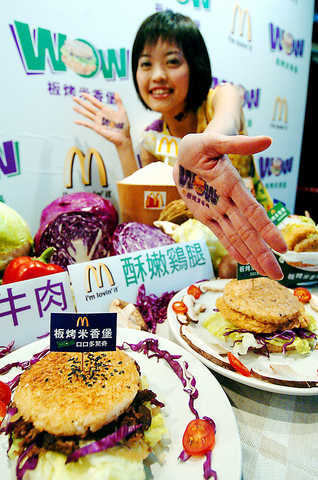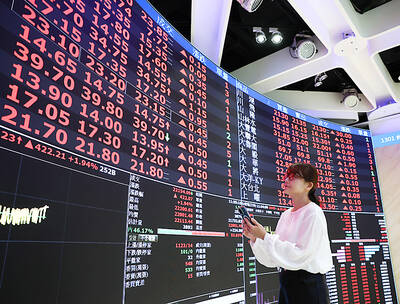After 18 months of research and development, McDonald's Restaurants (Taiwan) Co officially unveiled a new menu yesterday, making Taiwan the first nation to offer rice burgers under the golden arches.
Dubbed a marriage between Eastern and Western culture, the company is offering two flavors of toasted rice burgers, with a choice of either chicken or beef, which is sandwiched between two rice cakes.
The fast-food giant has in recent years hosted a series of health campaigns amid growing public worries over the high fat content of its food.

PHOTO: SEAN CHAO, TAIPEI TIMES
Healthier Menu Items
Aiming to convince consumers of its healthy message, McDonald's Taiwan said its research included meeting with 41 focus groups and interviewing over 3,000 customers to dish out the new products.
Other additions to the firm's new menu include clam soup and salads, seemingly sending a clear message that the restaurant chain is attempting to reverse its notorious image through offering more localized dishes and healthier food.
Company executives brushed aside suggestions that this was the case, however.
Obesity among Taiwanese males aged over 19 has been growing in recent years, Chu Nien-feng (祝年豐), a physician at the department of public health of the Tri-Service General Hospital, said at a press conference in December last year. The number of women with a waist size bigger than 80cm has reached 40 percent of the female population over the past 20 years, far higher than the 20 percent for males, he added at the conference.
Rice Strategy
The company also hopes its efforts can help to boost its penetration rate in rice-loving societies, McDonald's Taiwan's chief executive officer Steven Lee (
Deemed an important step to expand its market share at a time when more people are preferring to eat out, the company will use 15 to 20 percent of its annual marketing budget -- which stand at hundreds of millions of NT dollars -- to promote the new products, said Viya Chen (
Although not the first restaurant chain to offer rice burgers in Taiwan, McDonald's is confident the quality of its product can beat that of smaller competitors Mos Burger and 7-Eleven convenience stores, which started selling microwaved rice burgers in December 2003.
Giorgio Minardi, McDonald's vice president and chief marketing office for the Greater China region, said he expects to bring the products to other Chinese societies soon if the response here is encouraging.

UNCERTAINTIES: Exports surged 34.1% and private investment grew 7.03% to outpace expectations in the first half, although US tariffs could stall momentum The Chung-Hua Institution for Economic Research (CIER, 中華經濟研究院) yesterday raised its GDP growth forecast to 3.05 percent this year on a robust first-half performance, but warned that US tariff threats and external uncertainty could stall momentum in the second half of the year. “The first half proved exceptionally strong, allowing room for optimism,” CIER president Lien Hsien-ming (連賢明) said. “But the growth momentum may slow moving forward due to US tariffs.” The tariff threat poses definite downside risks, although the scale of the impact remains unclear given the unpredictability of US President Donald Trump’s policies, Lien said. Despite the headwinds, Taiwan is likely

READY TO BUY: Shortly after Nvidia announced the approval, Chinese firms scrambled to order the H20 GPUs, which the company must send to the US government for approval Nvidia Corp chief executive officer Jensen Huang (黃仁勳) late on Monday said the technology giant has won approval from US President Donald Trump’s administration to sell its advanced H20 graphics processing units (GPUs) used to develop artificial intelligence (AI) to China. The news came in a company blog post late on Monday and Huang also spoke about the coup on China’s state-run China Global Television Network in remarks shown on X. “The US government has assured Nvidia that licenses will be granted, and Nvidia hopes to start deliveries soon,” the post said. “Today, I’m announcing that the US government has approved for us

When Lika Megreladze was a child, life in her native western Georgian region of Guria revolved around tea. Her mother worked for decades as a scientist at the Soviet Union’s Institute of Tea and Subtropical Crops in the village of Anaseuli, Georgia, perfecting cultivation methods for a Georgian tea industry that supplied the bulk of the vast communist state’s brews. “When I was a child, this was only my mum’s workplace. Only later I realized that it was something big,” she said. Now, the institute lies abandoned. Yellowed papers are strewn around its decaying corridors, and a statue of Soviet founder Vladimir Lenin

The National Stabilization Fund (NSF, 國安基金) is to continue supporting local shares, as uncertainties in international politics and the economy could affect Taiwanese industries’ global deployment and corporate profits, as well as affect stock movement and investor confidence, the Ministry of Finance said in a statement yesterday. The NT$500 billion (US$17.1 billion) fund would remain active in the stock market as the US’ tariff measures have not yet been fully finalized, which would drive international capital flows and global supply chain restructuring, the ministry said after the a meeting of the fund’s steering committee. Along with ongoing geopolitical risks and an unfavorable